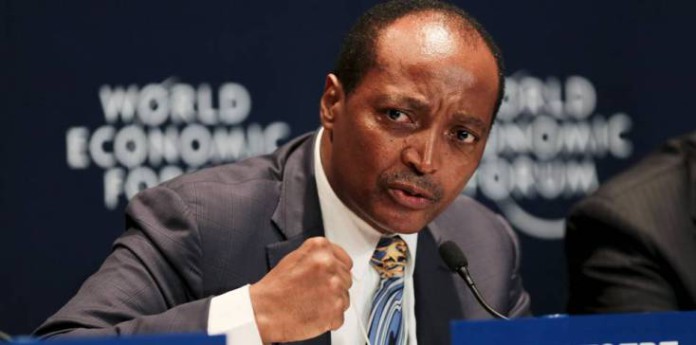
AFRICAN Rainbow Minerals’ (ARM’s) solid results for the year to end-June have moved the group into a powerful financial and strategic position, but investors appear worried management could embark on a major new project that could destroy value.
That was the underlying tone of the questions fired by analysts at ARM executive chairman, Patrice Motsepe, and CEO, Mike Schmidt, at today’s presentation in Johannesburg.
Trading reaction on the JSE was cautious.
ARM’s shares initially jumped to R134 in early trading, but then slid back by midday and were basically unchanged from the previous day’s close of around R129/share. That’s despite the declaration of a 750 cents/share final dividend to make a total of R10 for the year which puts on ARM on a highly attractive historic yield of 7.8%.
The key takeaways from ARM’s latest numbers are that it returned to a net cash position of R995m at end-June compared with net debt of R1.27bn a year previously, and it has finalised the ARM Coal debt re-structuring with partner Glencore. That restructuring was heavily in ARM’s favour with ARM crediting a “net fair gain value” of R977m to headline earnings which jumped 51% to R4.8bn (previous comparable figure R3.2bn).
According to Schmidt: “The restructuring significantly improves ARM and ARMCoal’s obligations in terms of these loans”.
Other important strategic development flagged by Schmidt was the growth in ARM’s manganese business which is now on a par with the formerly dominant iron ore division when measured by EBITDA (earnings before interest, tax, depreciation and amortisation). In financial year 2013, iron ore accounted for 59% of EBITDA and manganese just 14%, but the latest results show a healthy diversification with the two commodities level-pegging at 38% for manganese and 37% for iron ore.
Schmidt commented that “… manganese is starting to deliver results” and pointed out that the iron ore business “… has delivered below inflation cost increases for five consecutive years”. He added: “We have a robust situation on our balance sheet which offers a lot of opportunity going forward”.
So what’s not to like? Well, it seems some analysts want to see ARM commit to a firmer dividend policy paying out a greater proportion of earnings to shareholders because they are concerned that ARM could plough its new-found wealth into a major ‘value destructive’ new project.
One analyst pointed out this concern appeared to be the reason that ARM was not being rated as highly by the market as its peers despite the good results.
There appears to be a particular concern that ARM might somehow get involved in the Wafi-Golpu copper/gold project that Harmony – in which ARM is the largest shareholder with a 14% stake – is so keen to pursue in Papua New Guinea.
That prospect was raised in March – when ARM reported interim results – by Motsepe’s rambling answer to an analyst’s direct question in which he neither confirmed nor denied the suggestion of involvement with Harmony in Wafi-Golpu.
Schmidt today effectively stonewalled on the question. He said ARM had a dedicated management team looking at “all the options” in copper, but that it would be “irresponsible” to go public with any findings at this stage.
Motsepe said ARM’s business approach was conservative and the group was not keen on high risk greenfields projects but also that ARM wanted to grow. And he added: “We have confidence in the future of Harmony and of Wafi-Golpu in Papua New Guinea”.










